In light of the Army Corps of Engineers’ announced plan to evict the Standing Rock protectors, we share the story of the 1932 “Bonus Army.” With military veterans standing in solidarity with the #NoDAPL struggle, it is important to remember how the military has treated veterans demanding justice in the past.
Below is an essay and documentary video about the Bonus Army that can be used in the classroom. Please share this little known story and organize so that this history does not repeat itself. Our thanks to Pittsburgh middle school teacher Kipp Dawson for pointing out the parallels. She teaches her 7th graders about the Bonus Army each year and they are paying close attention to the history being made today at Standing Rock.
The Bonus Army
One little told story in U.S. history is of the thousands of WWI veterans who came as the Bonus Army to Washington, D.C. to make a demand for their promised wartime bonuses.
As Mickey Z. explains in the article below,
While they may have fought in Europe as a segregated army, the Bonus Army did not invite Jim Crow to this battle. Arriving from all over the country, alone or with wives and children, both black and white veterans of huddled together, mostly across the Potomac River from the Capitol, in what were called ‘Hoovervilles,’ in honor of the president who adamantly refused to hear their pleas.
The U.S. gov’t. responded with tanks, under the leadership of textbook heroes MacArthur, Patton, and Eisenhower.
♦♦♦♦♦♦♦♦♦♦♦♦
“In the sad aftermath that always follows a great war, there is nothing sadder than the surprise of the returned soldiers when they discover that they are regarded generally as public nuisances. And not too honest.” —H.L. Mencken
Long before the cries of “support the troops” became commonplace during every brutal U.S. military intervention, the powers-that-be made it clear how much they intended to follow their own counsel.
From Shays Rebellion in 1787 to the quarter-million homeless vets today, generation after generation of U.S. military personnel has suffered a lack of support from their government. The American soldiers who fought in World War I were no exception. In 1924, WWI vets were voted “Adjusted Compensation” by Congress: $1.25 for each day served overseas, $1.00 for each day served in the States. To the “doughboys,” it was seen as a bonus.
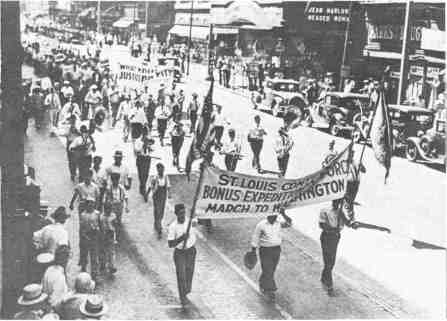 Veterans owed $50 or less were paid immediately. Everyone else was given a certificate that would collect 4 percent interest with an additional 25 percent tacked on upon payment. However, there was a catch: the certificate was not redeemable until 1945. . . and a little something called “The Depression” was looming over the horizon.
Veterans owed $50 or less were paid immediately. Everyone else was given a certificate that would collect 4 percent interest with an additional 25 percent tacked on upon payment. However, there was a catch: the certificate was not redeemable until 1945. . . and a little something called “The Depression” was looming over the horizon.
One of the enlisted men stuck in such a predicament was Joe T. Angelo of Camden, New Jersey. In 1918, Private Angelo saved the life of a certain Major George S. Patton on a battlefield in France (Angelo was Patton’s orderly). For his efforts, he was awarded the Distinguished Service Cross.
In the spring and summer of 1932, disgruntled, broke, and unemployed veterans like Angelo got the idea to demand payment on the future worth of the aforementioned certificates. Anywhere from 17,000 to 25,000 former doughboys formed a Bonus Expeditionary Force (BEF), otherwise known as the “Bonus Army,” and — bonus certificates in hand — they marched on Washington to picket Congress and President Herbert Hoover.
While they may have fought in Europe as a segregated army, the men of the BEF did not invite Jim Crow to this battle. Arriving from all over the country, alone or with wives and children, both black and white veterans of huddled together, mostly across the Potomac River from the Capitol, in what were called “Hoovervilles,” in honor of the president who adamantly refused to hear their pleas.
The House of Representatives passed the Patman Bill for veterans’ relief on June 15, 1932, but the bill met defeat in the Senate just two days later. More vets swarmed into the nation’s capital. Shacks, tents, and lean-tos continued to spring up everywhere, and the government and newspapers decided to play the communist trump card for the umpteenth time. Despite the fact that the BEF was made up of 95 percent veterans, the entire group were labeled “Red agitators” — tantamount to declaring open season on an oppressed group of U.S. citizens. Right on cue, Hoover called out the troops. . . led by three soon-to-be textbook heroes.
The commander of the operation was Army Chief of Staff Douglas MacArthur, who branded the BEF traitors bent on overthrowing the government. . . declaring, “Pacifism and its bedfellow communism are all around us.” MacArthur’s young aide was none other than Dwight D. Eisenhower, while Patton led the Third Cavalry-which spearheaded the eventual eviction of the Bonus Army. Patton shared MacArthur’s hatred of “reds” and lectured his troops on how to deal with the BEF: “If you must fire do a good job-a few casualties become martyrs, a large number an object lesson. . . . When a mob starts to move keep it on the run. . . . Use a bayonet to encourage its retreat. If they are running, a few good wounds in the buttocks will encourage them. If they resist, they must be killed.”
The three military icons got their chance on July 28, 1932 when a scuffle by the BEF and D.C. police resulted in two fatally wounded veterans. The U.S. Army assault integrated four troops of cavalry, four companies of infantry, a machine gun squadron, and six tanks. When asked by BEF leader Walter Waters if the Hoovervilles campers would be “given the opportunity to form in columns, salvage their belongings, and retreat in an orderly fashion,” MacArthur replied: “Yes, my friend, of course.” But, after marching up Pennsylvania Avenue, MacArthur’s soldiers lobbed tear gas and brandished bayonets as they set fire to some of the tents. In a flash, the whole BEF encampment was ablaze.
“Disregarding orders-a common thread running through his career-MacArthur decided to finish the job by destroying the Bonus Army entirely,” historian Kenneth C. Davis writes. “After nightfall, the tanks and cavalry leveled the jumbled camps of tents and packing-crate shacks. It was put to the torch.”
Video Clip
Bonus Army: US military attacks demonstrating American War Veterans
Two veterans lost their lives in the assault and an eleven-week-old baby died from what was believed to be gas-related illness. In addition, an eight-year-old boy was partially blinded by gas, two police had their skulls fractured, and a thousand veterans suffered gas-related injuries.
In the smoldering aftermath, a dazed, rail thin Joe Angelo approached his old boss but was harshly rebuked. “I do not know this man,” Major Patton growled. “Take him away and under no circumstances permit him to return.”
The next day, the New York Times ran an article under the headline: “A Calvary Major Evicts Veteran Who Saved His Life in Battle.”
After this impressive military success, the members of the BEF were forced to leave Washington and many of them joined the other two million or so Americans who lived their lives on the road during the Great Depression.
“Some states, like California,” Davis notes, “posted guards to turn back the poor.”
Less than ten years later, MacArthur, Patton, and Eisenhower would be earning a place in history books by sending many of those same disenfranchised poor to grisly deaths on the battlefields of Europe and the Pacific.
Franklin Delano Roosevelt was a candidate for president in 1932. It is said that the day after the BEF eviction, he told an aide there was no longer any need for him to campaign against Herbert Hoover. He may have been right. . . but his subsequent election did little to help WWI veterans. FDR not only refused to pay the bonuses; he also reappointed MacArthur as Army Chief of Staff.
Roosevelt did throw some veterans a New Deal bone when bonus seekers were given the opportunity to work in “Veterans Rehabilitation Camps” like those in the Florida Keys. There they met with an ignominious end on Labor Day 1935 when “a hurricane unlike any ever recorded in the United States”
struck.
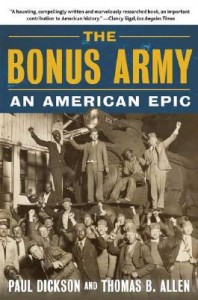 “Wind gusts estimated at two hundred miles an hour slammed into the work camps in Florida’s upper Keys, turning granules of sand into tiny missiles that blasted flesh from human faces,” write Paul Dickson and Thomas B. Allen in Bonus Army: An American Epic. “The storm brought death to at least 259 veterans. The final indignity was mass cremation.”
“Wind gusts estimated at two hundred miles an hour slammed into the work camps in Florida’s upper Keys, turning granules of sand into tiny missiles that blasted flesh from human faces,” write Paul Dickson and Thomas B. Allen in Bonus Army: An American Epic. “The storm brought death to at least 259 veterans. The final indignity was mass cremation.”
Despite such treatment, the legacy of the Bonus Army lives on not only in the passing of the G.I. Bill in 1944, but in every sit-down strike, every march, and every demonstration for economic justice. As the Washington Evening Star wrote during the Bonus Army’s stay in D.C., “These men wrote a new chapter on patriotism of which their countrymen could be proud.”
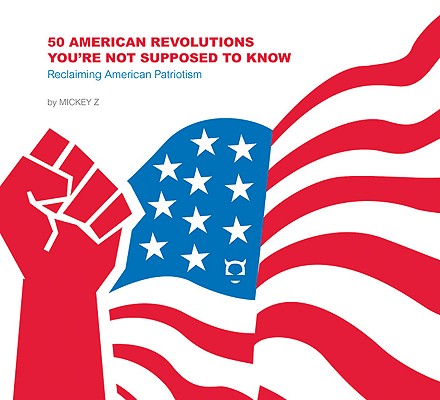 Reprinted with permission of the author from 50 American Revolutions You’re Not Supposed to Know: Reclaiming American Patriotism (Disinformation Books) by Mickey Z.
Reprinted with permission of the author from 50 American Revolutions You’re Not Supposed to Know: Reclaiming American Patriotism (Disinformation Books) by Mickey Z.
See this PBS documentary, “The March of the Bonus Army.”

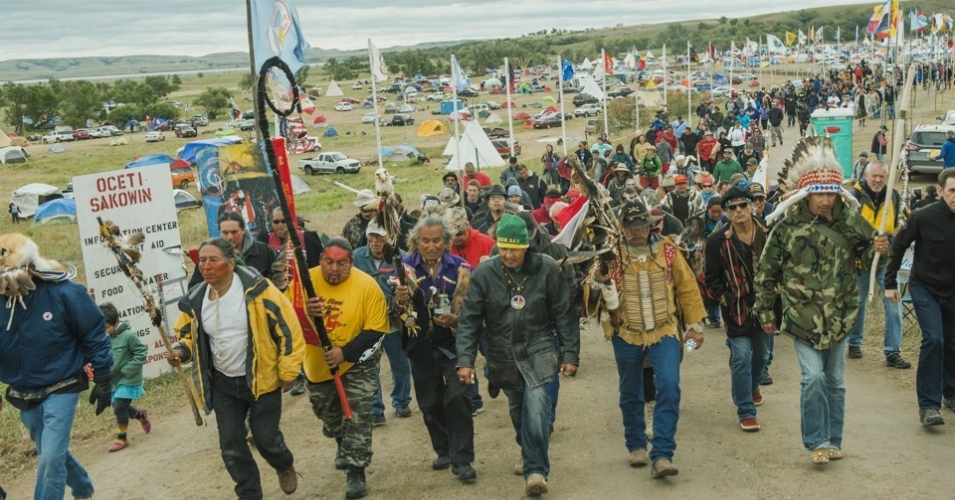
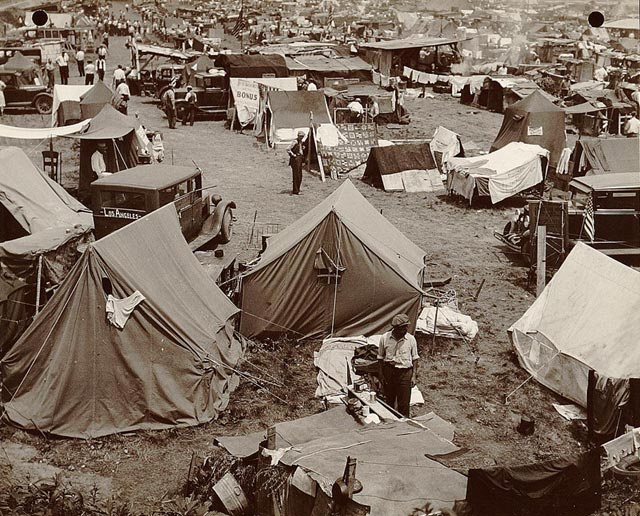
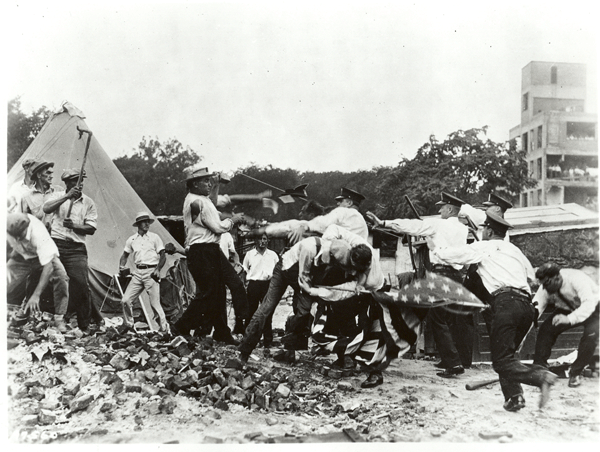
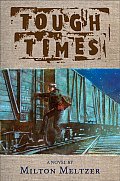






Patton’s remark was ironic, considering that Joe Angelo saved his life after Patton was shot in the rear end.
Short story about the Bonus Army: http://www.storystar.com/php/read_story.php?story_id=10917
My Dad was in WWII, Paratroop/Infantry. He hated MacArthur, said he was a real bastard who had no regard for the soldiers ;
;he was only interested in his “legacy” and power/fame.
President Hoover was in over his head with the Great Depression (who wasn’t?) but he was a principled man who tried to do what he believed was right. However there can be no kind words for Douglas MacArthur who can best be described as self-serving if not egomaniacal. His performance against the Bonus Army can only be matched by his total incompetence preparing for and fighting against the invasion of the Philippines. Too bad the Japanese weren’t unarmed and offering no real resistance, he might have done better.
The British soldiers weren’t treated that much better, they were basically left to fend for themselves, despite their injuries. Ironically, the best treated soldiers were German..
They are still treating veterans with no respect.
I am simply without words, almost in a state of disbelief when I read this story of the Bonus Army March after WW1. I find it hard to believe that nothing was mentioned in the history books, in the classroom education of our students of American History, of which I am one. The final insult would be to learn of General MacArthur and bloodthirsty Patton’s subsequent glories in WW2 military exploits.
Our country has no shame in the way the veterans are treated. As a personal aside, my father was a pilot in the Viet Nam war and died as a result of the Agent Orange pesticide used my OUR military to help see the Viet Cong better in the jungle foliage. It took almost 20 years AFTER his teach to have the Government take responsibility and pay the widow’s (one of which was my mother) of these men their government benefits. This is just one of hundreds of stories of the disgrace and humiliation our men and women endured, and STILL endure after their return, if lucky, to the country they defended. Save the balloons, parades and cheap articles of insincere loyalty once a year on Veteran’s Day to the men and women who serve our country. It only makes us see what our government REALLY is a SELF-SERVING enterprise of bloodthirsty leaders and corrupt statesmen.